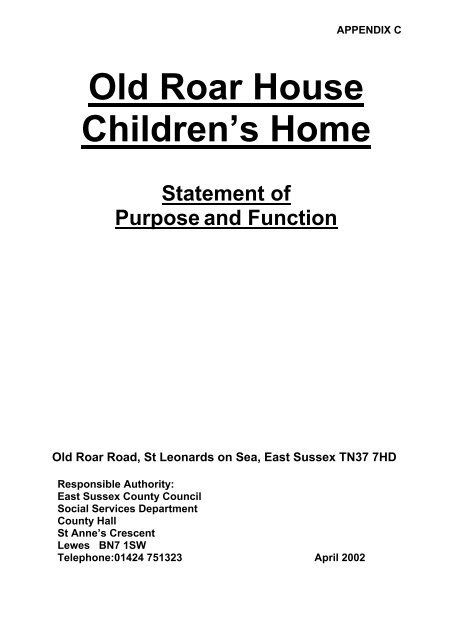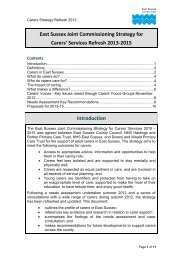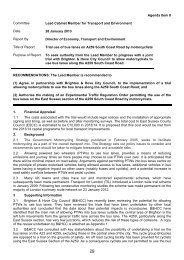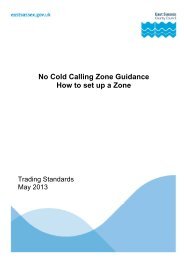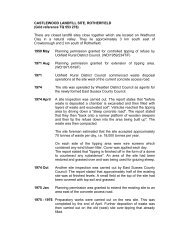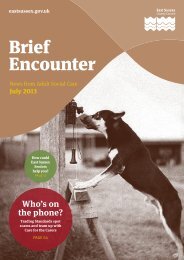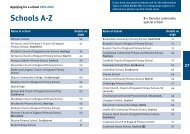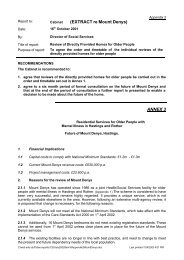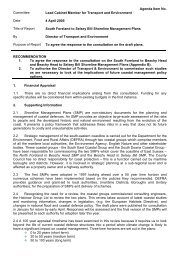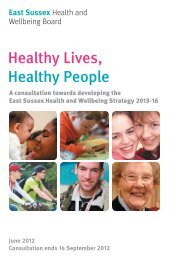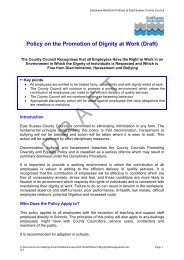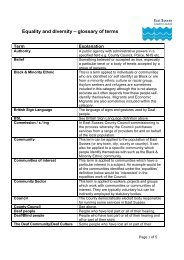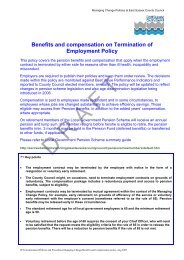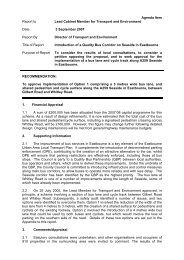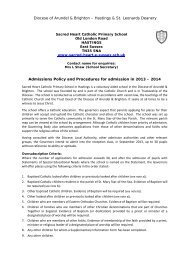Old Roar House Children's Home - East Sussex County Council
Old Roar House Children's Home - East Sussex County Council
Old Roar House Children's Home - East Sussex County Council
You also want an ePaper? Increase the reach of your titles
YUMPU automatically turns print PDFs into web optimized ePapers that Google loves.
APPENDIX C<strong>Old</strong> <strong>Roar</strong> <strong>House</strong>Children’s <strong>Home</strong>Statement ofPurpose and Function<strong>Old</strong> <strong>Roar</strong> Road, St Leonards on Sea, <strong>East</strong> <strong>Sussex</strong> TN37 7HDResponsible Authority:<strong>East</strong> <strong>Sussex</strong> <strong>County</strong> <strong>Council</strong>Social Services Department<strong>County</strong> HallSt Anne’s CrescentLewes BN7 1SWTelephone:01424 751323 April 2002
Establishment<strong>Old</strong> <strong>Roar</strong> <strong>House</strong>Childrens <strong>Home</strong>Registered ProviderHelen DaviesAssistant Director- Children & FamiliesSocial Services Dept.<strong>County</strong> HallSt Anne’s CrescentLewes<strong>East</strong> <strong>Sussex</strong>BN7 1SWTel: 01273 481000Operations ManagerResidentialGinnie SweetmanRegistered ManagerMike FunnellADDRESSCONTACT<strong>Old</strong> <strong>Roar</strong> Road Tel: 01424-751323St Leonards on Sea<strong>East</strong> <strong>Sussex</strong> Fax. 01424-754110TN37 7HDCORE STATEMENT<strong>Old</strong> <strong>Roar</strong> <strong>House</strong> is a medium to long term residential facility,which provides accommodation for up to eight young people ofeither gender, age between eleven and seventeen years.The client group consists mainly of young people whoseemotional and behaviour difficulties have led to a breakdown intheir previous placement.The primary aim of the <strong>House</strong> is to provide and allow opportunityto assess individual need, plan appropriate forms of interventionand identify the most appropriate longer-term placement.Working in partnership with families and other agencies isparamount in this process.Revised May 2002
1. Operational Policy1.1 <strong>Old</strong> <strong>Roar</strong> <strong>House</strong> is a residential children’s home. It is anintegral part of the residential accommodation service for <strong>East</strong><strong>Sussex</strong> <strong>County</strong> <strong>Council</strong> Social Services Department embracingrecommendations as described in the Quality Protects agendaand provides services to children and their families across thecounty.1.2 <strong>Old</strong> <strong>Roar</strong> <strong>House</strong> is registered with the National Care StandardsCommission and complies with the national minimum standards.It operates within the Children Act 1989 and the Childrens<strong>Home</strong>s Regulations 2001. Alongside this, the <strong>House</strong> complieswith the operational policies, guidance and instructions laid outby <strong>East</strong> <strong>Sussex</strong> Social Services Department.1.3 The <strong>House</strong> has a clear definable admissions procedure, whichprovides a firm structure to the case planning process. It alsoensures that realistic timescales are identified and agreed for achild’s stay within the <strong>Home</strong>.1.4 The management structure and the <strong>House</strong>’s internal scheme ofdelegation is clearly defined and ensures that effective decisionmaking in relation to the needs of the young people within the<strong>House</strong> is made. It is a management task to assess thatplacements are appropriate given the needs of the youngperson, taking into account the mix of residents currently withinthe <strong>House</strong>. Clear and firm expectations towards the placingsocial worker during the initial placement phase, increases thelikelihood of meeting targets consistent with the case planobjectives and that any placement drift will be highlighted andresolved at an early stage.1.5 The <strong>House</strong> aims to provide a caring and comfortableenvironment in which a young person can feel safe and secure.The key principal enshrined within the <strong>House</strong>’s operational ethosis that residential care can be a positive experience, which offersan opportunity to be both creative and innovative within the careplanning process.1.6 The core concepts for practice within the <strong>House</strong> are based upona theoretical framework of assessment, planning, interventionand evaluation. All young people admitted to <strong>Old</strong> <strong>Roar</strong> <strong>House</strong>are participants within this process, which provides thefoundation for individual care planning at all levels of their periodof accommodation.
1.7 The health of a child is considered of paramount importance andto support this, the services of a Consultant Child andAdolescent Psychiatrist, Clinic Nurse Specialist and local HealthCentres are available to the unit to help support staff, youngpeople and their families and contribute to effective andcohesive teamwork.1.8 Whilst we do not offer formal education within the <strong>House</strong>, staffmembers, in conjunction with parents and social workcolleagues, remain proactive in attempting to secure formaleducation in a recognised establishment within <strong>East</strong> <strong>Sussex</strong>.Links have been established with Designated Teachers, TutorialEducational Support Teams and the LEA Children’s Adviser.1.9 The philosophy and care culture within the <strong>House</strong> activelypromotes the notion of protection of individual rights. Allresidents are encouraged to participate in activities outside ofthe centre and to maintain family contacts on a regular basis. Allyoung people have unsupervised access to a telephone.Information from <strong>East</strong> <strong>Sussex</strong> Social Services Department’sComplaints Department at <strong>County</strong> Hall is easily accessible toyoung people within the home.In addition to this, the home participates within an independentrepresentative and advocacy service provided by the “XpressAdvocacy Service” project. The Independent Representativefrom Xpress visits the home on a weekly basis.1.10 Emphasis is given to ensuring an effective and efficient serviceis maintained via comprehensive quality assurance systems. Asrequired in the Departmental Best Value Performance Plan,systematic user feedback is obtained to measure outcomes.1.11 The Warner recruitment process is rigorously observed to for allcare staff appointments and the TOPPS induction programme isin place for all new recruitments. Individual and teamdevelopment plans are seen as crucial to our work and theseare processed through regular supervision, personaldevelopment systems, individual training profiles and acomprehensive training package.
1.12 Comprehensive Team Plans are clearly linked to Governmentagendas, in particular Quality Protects objectives. Our mainservice objectives fall under the following 5 headings:-• Promote learning and development opportunities for staff• Constantly strive to improve the quality of service we provide• Meet the health and educational needs of all young peoplewe look after• To actively involve users in planning and delivery of service• To develop effective partnership with other agenciesSpecific practice standards are contained primarily in the followingdocuments:-Children’s <strong>Home</strong>s Regulations 2001The Children Act 1989The Children Act 1989 Guidance Volume 4Care Standards Act 2000Children’s <strong>Home</strong>s National Minimum StandardsThe Children (Leaving Care) Act 2000E.S.C.C. Departmental Operational Instructions<strong>East</strong> <strong>Sussex</strong> Child Protection ProceduresHuman Rights ActHealth and Safety LegislationData Protection ActSocial Services Best Value Performance PlanQuality Protects Management Action Plan2. Facilities2.1 <strong>Old</strong> <strong>Roar</strong> <strong>House</strong> is a large Victorian building set in two acres ofbeautiful grounds, this includes a small football pitch, car parkand a lovely array of flower beds, lawns and trees.2.2 Special attention has been placed in providing a relaxed andcaring atmosphere. Both staff and young people participate inhousehold chores and clear expectations are placed upon youngpeople looking after their own bedrooms and respecting theliving environment which they share with others. This sense ofresponsibility is actively promoted and maintained at the regularresidents meetings.
2.3 We have a very spacious modern domestic kitchen where attimes our young people are allowed to cook and bake tastydishes, under staff/cook’s supervision. The kitchen as withmost homes is a focal point of the house generating warmth andconversation whilst appetites are satisfied!2.4 The main living area offers a range of facilities which includemusic, television, indoor games, arts, crafts and individualhobbies.2.5 Young people are actively encouraged to promote their sense ofself within their own living environment and all have their ownbedrooms. As a matter of good practice, no bedrooms arelocked but young people do have the option to lock their doors,with staff having the facility to override the lock in cases ofemergency.2.6 On the third floor away from the main living area is a Play roomfacility where young people can spend quality time on anindividual basis with staff. This may be used for dialoguebetween a young person and their key-worker or simply to allowa young person to play with the toys and regress if need be,without fear of any peer group pressure.2.7 Also situated at the entrance to the grounds we have a spaciousout building recently refurbished and converted into an ActivityCentre. Within the building are I.T computer/printer facilities,art/pottery workshop, photography dark room area and indoorsports equipment. During the week-days the Activity Centre isused specifically as an educational environment for youngpeople not attending full-time school i.e. facilitating help withMaths, English, as well as life and social skills workshops, artsand crafts.2.8 On the evenings and weekends the Activities Centre is used in amore recreational capacity for indoor sports i.e. pool, snookerand table tennis. Adjacent to the front side of the building is apatio area used for basket ball practice, and for sitting andchatting.2.9 Strong emphasis is placed upon young people participating inthe dynamics of group living and, to provide a focus, residentsmeetings are held every week, covering a variety of issues. Theparticipation of young people within the decision-makingprocesses, which can affect their daily lives, adds to the senseof positive self-regard and respect for the living environment andothers.
3. <strong>Old</strong> <strong>Roar</strong> <strong>House</strong> Staffing StructureOperations ManagerUnit Manager(Registered Manager)Resource Officer2Night CareOfficers12.5Group Workers1.5AdminAssistants4.25Support Staff7Relief staff
4. Staff Qualifications – ExperiencePOSITION NAME QUALIFICATIONS/EXPERIENCEOperations Manager Ginnie Sweetman 1982 C.S.S.1992 Certificate in Management1995 N.V.Q. Level 4 Management24 years Residential Experience1999 N.V.Q. Internal VerifierRegistered Manager Mike Funnell Diploma Art & Design (fine art)Art Teachers CertificateNVQ Assessor18 years Residential ExperienceResource Officer Dave Taberer NVQ Assessor18 years Residential ExperienceGroup Worker Linda Loveland Certificate in Therapeutic Child Care(Shift Leader)NVQ Level 3 in Caring for Children &Young PeopleNVQ Assessor14 years Residential ExperienceJackie Brooker(Shift Leader)Trevor Bloomfield(Acting Shift leader)NVQ Level 3 in Caring for Children &Young PeopleNVQ Assessor18 years Residential ExperiencePRICE InstructorSept 2001 to undertake NVQLevel 3 in Caring for Children &Young People9 years Residential ExperienceChris Makin Social Care II Level 3(Shift Leader)NVQ Level 3 in Caring for Children &Young PeopleNVQ AssessorJanuary 2002 undertaking Diploma inTherapeutic Child Care9 years Residential ExperiencePaul SmithCertificate in Therapeutic Child CareOU DIPSWA Jan’99-Aug 2002(Seconded to Patch Officer Oct’2002)
Group Worker (cont’d)Anna JefferyNVQ Level 3 In Caring forChildren & Young People18years Residential ExperienceJackie Carpenter 3Certificates in appliedProfessional Studies –i. Reading & Display ii. IT &Special Educational needs iiiA Child study – specialeducational needsDiploma in appliedProfessional StudiesAppointed First AidNVQ Level 3 in Caring forChildren & young people4 years Residential ExperienceNight Care OfficerLee HineStephan BartonSimon Treen(from June 2002)Jane Bosley(temp)Jeanette JonesColin BlackmanSept 2001 undertaking NVQLevel 3 in Caring for Children&Young people8 years Residential ExperienceSept 2002 to undertake NVQLevel 3 in Caring for Children& Young People8 mths Residential Experience8 mths Residential ExperienceDiploma in PaediatricNursing5 yrs Residential ExperienceOU Degree Bsc Hons.(1 st class),Diplomas in Social Sciences,Health & Social Welfare,Certificate in HealthPromotion, Business StudiesHNC, Postgraduate Diplomain Psychology,Social Policy & Criminology4 yrs Residential Experience18 mths Residential Experience
Relief Group WorkerChrissie Richards 4 yrs Residential experienceLynda Crouch9 yrs Residential experiencePeter Labyk1 yr Residential experienceJackie Bashford22 mths Residential experienceJean Davies22 mths Residential experienceArlo Adam20 mths Residential experienceKaterina Curtis16 mths Residential experienceCaroline Anderson-Jones Certificate in TherapeuticChildCare, M.A.in TherapeuticChild Care, Therapeutic ChildCare Certificate in Education,BA in Art misc. inScience/psychology degree4 yrs Residential experienceAdmin AssistantPauline Whittington-Booth Secretarial QualificationsNVQ Level 2 AdministrationSue WisemanSecretarial QualificationsSupport StaffCook Sheree Ellwood Certificate in Food HygieneVal ButchersCertificate in Food HygieneDomestic Assistant Caroline NealeAvis TompsettHandyman/gardener Ben Fowle5. Staff Development5.1 The selection of staff is critical to the provision of a qualityservice and ensuring the protection and safety of childrenaccommodated. The <strong>House</strong>’s recruitment process is rigorousand challenging and in line with the “Warner” Committee reporton staff recruitment and selection within residential units.5.2 Clear expectations are placed upon staff within the <strong>House</strong> inrelation to their commitment towards achieving high standards ofpractice and care for service users. Strong emphasis is placedupon individual staff supervision and practice competency
planning through the TOPPS induction and foundation processfor all newly appointed staff.5.3 Every member of staff has a personal development review whichmeasures their performance against departmental, team plansand incorporates a development action plan for the year ahead.The monitoring of PDS forms part of regular supervision andindividual agreements are tailored to the needs of the individualsupervisee and reviewed on a six monthly basis.5.4 In addition to this, an active commitment plan is given toprofessional training and development through individual andteam training programmes. A rolling programme is in place forall staff to achieve N.V.Q. Level 3, Caring for Children andYoung People. On site we have 5 Assessors and one N.V.Q.Internal Verifier.6. Services Provided6.1 The young people admitted to <strong>Old</strong> <strong>Roar</strong> <strong>House</strong> have verycomplex emotional and behavioural needs which invariably haveled to multiple breakdowns in previous placements. These willout weigh any disability. We aim to meet their psychological,social, emotional health and educational needs within a nonrejectinghomely environment.6.2 In almost all cases, admission to the <strong>House</strong> will be planned andas such would have been subject to a pre-admission planningmeeting involving the young person, parents and relevantprofessionals. Identification of the young person’s co-ordinatorwithin the <strong>House</strong> will have taken place prior to this meeting,ensuring that the primary service users are able to meet the coordinatorwithin the residential setting before admission.6.3 Agreement as to the purpose and duration of the placement isconfirmed at this pre-admission stage and emphasis is placedupon the social worker to provide relevant and accurateinformation within the “Looked After Children” framework.6.4 The core assessment model is primarily based on theFramework for the Assessment of Children in Need and theirFamilies (HMSO 2000) Assessment.
6.5 A plan of intervention identifies targets for measurement whichare regularly evaluated for their effectiveness. Individual careplanning allows the opportunity to focus on the outcomes fromboth initial and on-going assessment process. This is formallymonitored by the Looked After Childrens Review process.6.6 The services of a Child Psychiatrist and Clinical Nurse Specialistare available one day a week in an advisory, supervisory andtraining capacity to the staff group. Their roles are vital in theplanning of the work to be undertaken with young people whoare resident, as well as working with their families.6.7 Additional services which could form part of a young person’scare plan include:-• Psychiatric and psychological assessment via CAMHS andEducation.• Access to individual counselling• Group Work• Family Work• Art/Play Therapy• Substance Misuse Support Team• Independence Training• Pre and post placement support work• Joint work with the Tutorial Education Support Team• Joint work with the Leaving Care Team• Joint work with the Youth Offending Teams• Joint work with the Fostering Teams• Leisure and recreational activities• Missing from Care – NMPHAll aspects of the service provided are within the context ofachieving the aims of the care plan and meeting the identifiedneeds of the young person.7. Referral Procedure7.1 All referrals to <strong>Old</strong> <strong>Roar</strong> <strong>House</strong> are for young people who areresident within the boundaries of <strong>East</strong> <strong>Sussex</strong> <strong>County</strong> <strong>Council</strong>.No referrals are accepted from other local authorities.7.2 Either the Operations Manager or Registered Manager takesreferrals direct from the social worker. Referrals must have theagreement of both the Practice Manager responsible for thefieldwork team and the relevant Operations Manager.
7.3 The admission process can be an anxiety provoking situation formost young people and every effort is made to make theexperience positive and constructive. Emphasis is placed uponinformation for the young person and developing anunderstanding as to the plans for them in relation to their periodin <strong>Old</strong> <strong>Roar</strong> <strong>House</strong>. A handbook is provided for young people,which explains some of the core aims and expectations of the<strong>House</strong>. A similar handbook is provided for parents.7.4 Every effort is made to minimise the effects upon the rest of theclient group when an admission occurs and preparatory work isundertaken with the group when a planned admission is to bemade.7.5 Every young person admitted to <strong>Old</strong> <strong>Roar</strong> <strong>House</strong> is allocated aresidential Co-ordinator who has the responsibility for coordinatingall aspects of the young person’s residential careexperience. With all planned admissions, the Co-ordinator willhave already met the young person and other significant adultsprior to admission. The Co-ordinator will undertake theadmission process with the young person as a matter of goodpractice, allowing both consistency and continuity.7.6 Every effort is made to ensure that parents participate in boththe planning stage and during the admission itself. Whereappropriate, parents are actively encouraged to understand theaims and objectives of the <strong>House</strong> and to play a key role in theirchild’s stay. Practical assistance is provided to ensure thatcontact is maintained between the residential and field keyworkers with families, to assist the assessment process andprovide practical information relating to the relationshipdynamics between a young person and their family.7.7 The admission phase of a young person’s stay at <strong>Old</strong> <strong>Roar</strong><strong>House</strong> provides the opportunity to develop the individual careplan which takes into account the needs and objectives of theplacement. The individual care plan is regularly reviewed at thecase planning meetings and every effort is made to ensure thatthe young person plays an active role throughout the planningprocess.7.8 The staff team take a pro-active approach towards ensuring thatthere is a daily routine for all young people within the <strong>House</strong>,and ensure that they are able to participate within this process.It is important for staff to plan the day or even the week ahead.The benefits are a sense of involvement for the young peopleand a degree of predictability in life, which for many had beenpreviously unknown.
7.9 The core principle of <strong>Old</strong> <strong>Roar</strong> <strong>House</strong> recognises the importanceof all planned admissions for all concerned and will aim toachieve this on each occasion. However it is also recognisedthat occasionally an emergency situation may arise these willonly be countenanced if:• Not to place a young person would render them homeless.• The young person meets the criteria for the home they are tobe placed in.• All other options have been explored (e.g. fostering, maintaincurrent placement with support, extended family) and are notviable.• The placement is agreed at Operational Manager level orabove.• The placement must be reviewed urgently after theadmission.The underlying principal remains that emergency admissions areavoided.8. Involving Young People in the Running of the <strong>House</strong>8.1 All the staff involved in the running of the homes are acutelyaware of past mistakes and scandals involving the residentialcare Nationwide. They are committed to seeking and valuingchildren’s feedback about their feelings and perceptions of thecare they are receiving and how the home is functioning.8.2 Children’s views about the running of the home are activelysought in the following ways:-• <strong>House</strong> meetings• Individual sessions with “preferred” members of staff• Feedback at meetings/reviews• Direct access to Managers• Access to an advocate via “Xpress”• Access to Inspectors, <strong>County</strong> <strong>Council</strong>lors and Reg.33 “OffLine Inspector.”• Access to a Complaints Officer.• Viewpoint interactive software, which provides young peoplean opportunity to contribute to the plans being made forthem.
8.3 We seek young people’s views about the care they receive andtheir experience of residential living via a questionnaire. Theco-ordinator will address any negative comments with the youngperson and seek ways in which their experiences can beimproved.The above is maintained via our comprehensive QualityAssurance System.9. Young People’s Rights, Representation And Complaints9.1 <strong>Old</strong> <strong>Roar</strong> <strong>House</strong> has an Independent Advocacy Service called‘Xpress’ whereby young people placed within the <strong>House</strong> haveaccess to an independent representative who visits <strong>Old</strong> <strong>Roar</strong><strong>House</strong> on a weekly basis, to ensure their rights are upheld andtheir voice heard.9.2 Social workers are expected to visit young people a minimum ofonce every two weeks and access for a young person to contacttheir social worker is unrestricted.9.3 On admission, young people are informed of their rights, whichincludes their right to complain about aspects of the servicebeing provided to them. All young people are encouraged toraise concerns in a positive way, with the intention of resolvingdifficulties. The <strong>House</strong> displays prominently the informationrelating to the Independent Representative and theDepartmental Complaints Officer. Records of all complaints arekept in line with Departmental policy.9.4 In addition to the above, <strong>Old</strong> <strong>Roar</strong> <strong>House</strong> is inspected twiceannually (one announced, one unannounced inspection) by theNational Care Standards Commission Inspectors.9.5 An Off-line Manager under Regulation 33 of the Children’s<strong>Home</strong>s Regulations 1991 carries out monthly inspections. Allreports are submitted to the Corporate Parenting panel for theirscrutiny and discussion with the Operations Manager andAssistant Director, Children and Families.9.6 Members visit <strong>Old</strong> <strong>Roar</strong> <strong>House</strong> on a rostered programme.9.7 The National Care Standards Commission can also receivecomplaints from young people, staff, family members and othersinvolved with children of the home, outside the home. TheNCSC can be contacted at Ivy Terrace, <strong>East</strong>bourne.
9.8 The following values underpin all aspects of the serviceprovided.Every young person has the right to pursue a normalpattern of life in the community, irrespective of origin,status, ability, sex, age, creed or contribution to society.The staff in <strong>Old</strong> <strong>Roar</strong> <strong>House</strong> work with young people, theirfamilies and other professionals to facilitate a successfultransition to their identified exit.Every young person has right of self-determination,choice, responsibility, value and dignity. <strong>Old</strong> <strong>Roar</strong> <strong>House</strong>aims to provide an atmosphere where young people canexperience a safe and caring environment, often havingexperienced the opposite prior to admission.10. Health10.1 It is recognised that young people admitted to residential careare particularly vulnerable as they frequently have not receivedcontinuity of health care. In view of this, staff play an active rolepromoting all aspects of a young person’s health by encouragingthem to take a responsible attitude towards their body andgeneral fitness. Attention is given to hygiene, personal care,exercise, diet and recreational activities. Health education onspecific issues including smoking, HIV/AIDS, drugs, solvent andalcohol misuse are considered important issues and links areactively maintained with relevant professional agencies.10.2 All young people have access to local G.Ps. Alternatively,where possible we endeavour to retain their own G.P. Strongemphasis is placed on ensuring that each young person has anup to date medical and that dental, eye care, and immunisationsare also up to date. A system is in place to monitor this.10.3 The service of a Child Psychiatrist and a Clinical NurseSpecialist are available to <strong>Old</strong> <strong>Roar</strong> <strong>House</strong> on one day a week tohelp support young people, their families and staff. Theprovision of this input ensures that a young person’s physical,mental, and emotional well being is given high priority. Specifictherapeutic techniques are carried out by qualified people onlyand supervised by an external qualified therapist in that field.
11. Promoting Education11.1 At <strong>Old</strong> <strong>Roar</strong> <strong>House</strong> we believe that obtaining a good educationcan be the key to vastly improving a young person’s lifechances. Helping a young person to attend and to succeed inschool is one of <strong>Old</strong> <strong>Roar</strong> <strong>House</strong>’s primary tasks. We aim toensure that young people in our care are given equal accessand opportunities to education, and that each young person willhave a Personal Educational Plan (PEP) targetting theindividuals specific needs. During their stay, each young personwill have an identified adult to support them both practically andemotionally whilst co-ordinating the PEP, alongside their socialworker.11.2 <strong>Old</strong> <strong>Roar</strong>’s expectation that young people will attend some formof educational placement. Where young people are not in fulltimeeducation <strong>Old</strong> <strong>Roar</strong> Activities Centre will be used to supportthe individuals PEP. It is essential this provision is notconsidered to be an alternative to a young person’s educationalplacement.11.3 A structured daily activity programme runs between 9.30 a.m. –2.30 p.m. Monday to Friday term time only.11.4 For young people awaiting a school placement, <strong>Old</strong> <strong>Roar</strong> staffaim to help them improve levels in numeracy, literacy and ITwhilst providing a range of art, history, geography, health andsocial education and sporting activities relevant to an individual’sNational Curriculum Attainment Targets (NCAT).11.5 Staff act as curriculum supporters and through sound planningand a knowledge of the individuals current educational needs,aim to improve a young person’s level of subject understanding.11.6 The following key principles underpin the ethos supporting ayoung person’s education.• All young people will be encouraged to attend schoolregularly.• Staff will ensure that a child’s Personal Education Plan forLooked After Children is understood and supported.• Co-ordinators will identify the named designated teacher atschool with whom workers will liaise at any given time.• Any attendance issues will be dealt with promptly and thenecessary people informed of non-attendance, i.e. school,parents and social worker.• Staff will actively encourage young people to completehomework, ensuring they understand what is being asked ofthem and assist in identifying any useful resources that couldhelp.
• At other times staff should support and encourage youngpeople to read as much as possible and research throughthe use of IT equipment, linking services and local resources.• Staff will encourage the young person and parents to attendparents evenings and school functions. In the event thatrelationships are not conducive to such attendance, staff willdiscuss with the young person who they wish to fulfil this role.A record of key dates will be kept in order to ensureattendance in order to support young people.11.7 Facilities for homework or private study:• An individual’s bedroom provides a private environment andis furnished with a desk, chair and adequate storageprovision for stationery and schoolbooks.• The Activities Centre can also be used as an alternative tostudy. Each young person having their own lockable drawer.• An internal library is available with access to fiction and nonfictionmaterial as well as reference books. <strong>Old</strong> <strong>Roar</strong> <strong>House</strong>is also linked in with the <strong>County</strong> Library service.• Young people have access to IT equipment.12. Maintaining Outside Contact12.1 Young people can often experience a sense of rejection,isolation and powerlessness when admitted into residential care.Outside contact is therefore, extremely important in helping toovercome these feelings and start to make sense of theiradmission. To help in this process, a clear expectation is madeto the young person’s social worker about the frequency ofvisiting with a minimum expectation of no less than every twoweeks.12.2 Contact by family and other persons identified by the youngperson as important are actively promoted through visits to <strong>Old</strong><strong>Roar</strong> <strong>House</strong> or their home. Contact through correspondenceand telephone is agreed with the young person’s social workerand ensures that any child protection issues are observed.12.3 Contact with social workers, legal advisers and independentvisitors are unrestricted and private.
13. Religious Observance13.1 On admission to <strong>Old</strong> <strong>Roar</strong> <strong>House</strong> staff ensure that enquiries aremade into the religious and cultural background of each youngperson as part of the overall care plan.13.2 Special efforts are made to help a young person maintain theirlinks with their particular church group or for making contact withone if they show an appropriate interest. Privacy can bearranged within the <strong>House</strong> for the purpose of prayer throughoutthe day. Every attempt will be made to give seriousconsideration to a young person’s cultural and dietary needs.14. Reviews14.1 In order to promote the welfare of each young person, it isimportant that, when considering placement in <strong>Old</strong> <strong>Roar</strong> <strong>House</strong>,there is a clear view as to what is hoped to be achieved byadmission and how this contributes to the overall care plan.14.2 In addition to statutory reviews held under Section 26 of theChildren Act 1989, case planning meetings are held to ensure ayoung person’s welfare is safeguarded and promoted throughcomprehensive planning. These meetings focus on a youngperson’s educational, behavioural, social, emotional and healthneeds and monitor how the placement plan is progressing in thecontext of achieving the overall care plan.14.3 All young people, parents and other interested parties areencouraged to attend. At <strong>Old</strong> <strong>Roar</strong> <strong>House</strong> we have introducedViewpoint interactive software, an enjoyable computerprogramme which gives young people, who are often the mostdifficult to engage the opportunity to express a voice in a reviewand/or planning arena. In the event of a young person notwishing to attend, the co-ordinator takes steps to ensure thatany feelings or wishes that the young person may wish to havevoiced at the meeting are presented and recorded. Also anAdvocate may attend to represent the young persons views.14.4 Co-ordinators will also produce a written report in consultationwith the young person for the planning meeting.14.5 Meetings are recorded and on the young person’s diary sheets.
15. Measuring Outcomes15.1 At <strong>Old</strong> <strong>Roar</strong> <strong>House</strong> we believe that no matter how well ourservice is packaged, what really counts is the way in whichyoung people actually benefit from the service and how theirlives change for the better. We feel it is important therefore tomeasure and evaluate the service we offer and ascertain theoutcomes as perceived by the young person.15.2 The system at <strong>Old</strong> <strong>Roar</strong> <strong>House</strong> allows us to measure movementfrom point of admission to discharge. At point of admissionevery young person, with the support of staff, completes abooklet which explores experiences, behaviours and feelings inall aspects of their lives. The information gained at this stage isinvaluable when formulating a programme of intervention tomeet individual needs through their stay.15.3 Prior to discharge a young person completes a booklet. Thiscovers the same areas explored on admission, thus creating atool whereby we can measure movement from point ofadmission to discharge. Following discharge the informationgained from both booklets is transferred onto a MeasuringOutcomes sheet for each young person. This information isthen collated and analysed to produce yearly statistics whichshow the degree of movement as perceived by the youngperson in the following areas:-• Understanding of the past• Relationships with:FamilyAdultsPeers• Self Esteem• Coping with Pressure• Absconding• Offending Behaviour• Health• Education15.4 Three months after leaving the young people are sent a bookletto find out whether their placement in <strong>Old</strong> <strong>Roar</strong> <strong>House</strong> had apositive influence on improving their lifestyle.15.5 A booklet is also sent to their parent’s and social worker toascertain their view of the service provided. Negative commentsare addressed with the aim of improving the service.
16. Child Protection16.1 All staff at <strong>Old</strong> <strong>Roar</strong> <strong>House</strong> are aware that a young person mayhave been abused and have been trained in the signs andindicators of abuse. Staff have key roles in identifying abuseand clear procedures to follow as set out in the ACPC childprotection procedures should a young person wish to disclose.16.2 The underlying principles which dictate practice in this matter,are:The <strong>East</strong> <strong>Sussex</strong> Child Protection Committee believe that:-• Young people are entitled to protection from neglect, abuseand exploitation.• A young person’s welfare is the paramount consideration.• Working in partnership with families and supporting parentalresponsibilities are vital to the protection of young people.• Child protection must take account of the racial, linguistic,cultural and religious needs and differences of young peopleand families.• Personnel from different agencies must work togetherconstructively.• Suitable forms of supervision and support are essential forthose persons who are formally responsible for protectingyoung people.16.3 Child protection work is strictly confidential among agencies inthe Area Child Protection Committee.16.4 If a young person chooses to share information with a memberof staff about an abusive incident they will be supported andmade to feel that they have done the “right thing”. The staff rolewill be one of listening as opposed to questioning in order to notimpede any subsequent investigation undertaken in line withachieving best evidence.16.5 No form of bullying is acceptable within <strong>Old</strong> <strong>Roar</strong> <strong>House</strong>. Staffraise awareness of bullying by:• Educating young people on the effects of bullying• Developing a culture in which respect and consideration forothers is fundamental.• Preventing bullying happening by being vigilant andconsistent in our approach.• Encouraging young people to report bullying with theknowledge that it will be taken seriously.
17. Control And Discipline17.1 The Children Act l989 Guidance Volume 4 states:“The major determinant in day to day control of the home is thequality of relationships between the staff and the children.Relationships must be based on mutual respect and recognisedgood professional practice. Difficulties will arise whereinconsistent, unrealistic or insensitive methods of control areused.”17.2 The ethos of <strong>Old</strong> <strong>Roar</strong> <strong>House</strong> emphasises that we believe theregulation to be correct and that our methods of work areplanned accordingly. We stress the need for mutual respectand fairness, combined with clear consistent boundaries, whichhelp establish a safe and caring environment. However, therewill be times when disciplinary methods are necessary and thefollowing sanctions are approved:• Restitution: i.e. the use of a proportion of pocket money tomake restitution for damage, stolen money or goods, or topay fines imposed by a court.• Reparation: i.e. where appropriate, making good or repairany damage.• Curtailment of leisure extras• Additional house chores• Increased supervision17.3 On occasions, physical restraint may be necessary to ensure thesafety of all concerned and it is therefore, important that staff areaware of the following guidelines:-Physical restraint is only exercised as a last resort in thefollowing circumstances:-When a young person is:• Likely to cause themselves physical harm• Likely to cause another person physical harm• Likely to cause serious damage to the fabric of the buildingand/or furniture and fittings17.4 All staff have been trained in P.R.I.C.E techniques (ProtectingRights In a Care Environment) which are based on therecommendations of the Children Act 1989.17.5 In every case, no more than the minimal force necessary is usedwithin the shortest timescale possible to achieve the objective.
The young person is given repeated opportunities to exercisetheir own self-control and the restraint is ceased at the earliestopportunity. The young person is talked through the incident,with the intention of ensuring they are fully aware of why ithappened and what can be learned and understood from it.17.6 It is recognised that often young people have great difficultyexpressing their feelings, which at times become sooverwhelming that frustrations are vented against people or theirsurroundings. Whilst we would not wish to condone illegalactions, we would also not wish to necessarily criminalise youngpeople. The involvement of police may be considered if suchviolence or damage is pre-meditated or sustained.17.7 All incidents are fully recorded and monitored by the Manager of<strong>Old</strong> <strong>Roar</strong> <strong>House</strong> and discussed in detail at the following teammeeting in order to ensure that any practice issues are identifiedand rectified if necessary.17.8 In addition to weekly monitoring the Unit Manager monitors theuse of control and discipline on a six monthly basis to identifyany emerging themes. Incidents are also closely monitored viamonthly and statutory inspections.18. Unauthorised Absence of Children18.1 A joint Police and Social Services protocol has been drawn upfor young people missing from care. All staff members haveaccess to written procedures in relation to what they should doin the event of a young person being absent without permission.Such procedures aim to ensure that young people are returnedto <strong>Old</strong> <strong>Roar</strong> <strong>House</strong> as quickly and safely as possible.18.2 Upon discovering that a young person is missing, having takeninto account the risk assessment, police may be informedimmediately and a ‘missing persons’ form completed by a policeofficer as soon as practical.The following people are also informed:-• Resource Officer• Children’s parents/guardian• Social Worker• Emergency Duty Service• Any other relevant person18.3 Every effort is made to return young people safely and allincidents of going missing are collated centrally within theDepartment and subsequently transmitted to the NationalMissing Persons Helpline.
18.4 On return to the <strong>House</strong>, all relevant people are informed. Thecircumstances surrounding the absence will be investigated anddiscussed with the young person, to ascertain their whereaboutsand activities whilst they were missing, with a view to helping theyoung person to keep themselves safe in the future. They mayhave access to an independent person to talk to.19. Electronic or Mechanical Surveillance19.1 <strong>Old</strong> <strong>Roar</strong> <strong>House</strong> does not use any electronic or mechanicalmeans of surveillance. However the Courts may decide toemploy electronic “tagging” as part of an order for a youngperson. When this occurs the guidance from the <strong>Home</strong> Office isfollowed and the young person is made aware of their rights andresponsibilities in complying with the order. This equipment isused solely for the purpose that it is intended and not assurveillance within the home.20. Fire Precautions20.1 <strong>Old</strong> <strong>Roar</strong> <strong>House</strong> is inspected by the <strong>East</strong> <strong>Sussex</strong> <strong>County</strong> FireOfficer as necessary, to ensure that fire precautions conditionsare satisfactory.The <strong>Old</strong> <strong>Roar</strong> site maintains the following:-• Adequate precautions are taken against risk of fire• Adequate means of escape in the event of fire• Adequate arrangements are made for detecting, containingand extinguishing fire• Adequate arrangements are made for warning of an outbreakof fire and for evacuation in the event of fire.20.2 Fire drills are held at least monthly at different times of the dayand a full record of all incidents is kept. No advance warning isgiven. All staff are aware of the procedures to be followed in theevent of a fire alarm sounding and these are explained to theyoung people at the point of admission.Footnote: We trust that this booklet which compliments our Guide for Parents and YoungPerson’s Handbook, has been helpful in gaining insight to the service offered by <strong>Old</strong> <strong>Roar</strong><strong>House</strong>. Should you require any additional information, please do not hesitate to contact us.Revised: MAY 2002


